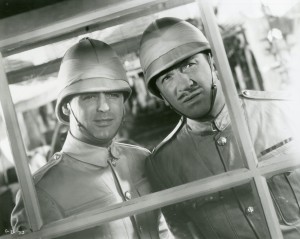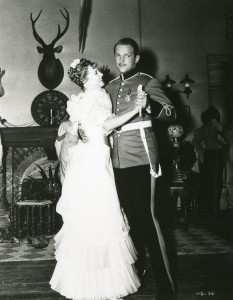by Barb Lentz.
The five movies Bob provided me from which to choose were these:
Birdy (1984)
Gunga Din (1939)
Putney Swope (1969)
A Touch of Class (1973)
The Unknown (1927)
I chose Gunga Din because it was the only title I recognized from this batch, so I figured it had the best chance of being a classic. I also wanted to see Cary Grant in an adventure film; most of what I’ve seen him in are comedies and he’s always wearing suits. It also looked like it was a British film — it wasn’t until afterward that I learned it had been shot in Lone Pine, California!
Gunga Din takes place in India, however, when British colonialists still ruled, largely through military force. Fifty years after the dangerous Thuggee cult has been eliminated in India by British interdiction a charismatic, ruthless descendant of the despotic Kali worshippers known only as Guru (Eduardo Ciannelli) organizes an army of Indians to kill every foreigner in sight and run the British out of India forever. It is in this hostile environment that Sergeants Cutter (Cary Grant), MacChesney (Victor McLaglen) and Ballantine (Douglas Fairbanks, Jr.) fight, drink, romance and carouse as only highly skilled British officers can.

It is the easy, relaxed, yet spirited camaraderie between the trio of sergeants that make this adventure so enjoyable. When we first meet them they are fighting some other soldiers, just having a blast beating the tar out of each other because somebody sold Cutter a phony treasure map. These men are only truly happy when there is something to be done; action is what they crave, and they are accustomed to going after it together. And while the situation around them begins to turn dark with mysterious slayings and disappearances, what really worries Cutter and MacChesney is that their pal Ballantine is threatening to give up soldiering and settle down with the beautiful Emmy (Joan Fontaine), a frilly sort of gal who promises to have Ballantine fully domesticated in short order. His friends are desperate for Ballantine to re-enlist for another nine-year hitch, but he is a fish who has already been caught and reeled in by the prettiest angler in India.
One skirmish with the new Thuggees should prove how dangerous things are, yet Cutter is more interested in treasure hunting, MacChesney with taking care of his elephant Annie, and Ballantine is just marking the days until he is ushered out of service. Cutter befriends the local water carrier, Gunga Din, who wants to be a professional soldier. It is Gunga Din who leads Cutter to a temple full of gold . . . and full of Thuggees as well. Cutter surrenders so Gunga Din can escape and return with reinforcements, but the Kali worshippers are far more numerous, intelligent and well led than anyone expects. It will take a miracle for the British to survive — and that miracle is Gunga Din.

Although this is a very dark story, the tone is generally light and humorous. Instead of suspense there is adventure; instead of dread there is resourcefulness. The heroism of the characters is believable and inspiring not because they are nobly fighting for Queen and country, but because they are fighting for each other. Even though they banter and trade insults incessantly they respect one another and do not want their comradeship to end. Ballantine is clearly torn between loyalty to his friends and accepting the love of a good woman. In battles, they watch after and protect one another. It is this fellowship that makes the adventure so enjoyable.
My top five moments of the movie are:
1. When MacChesney feeds the elephant Annie her medicine, having to show her that it is safe by pretending to drink it himself. For someone who has no children, MacChesney seems awfully familiar with the methods needed to have a recalcitrant child (or in this case, pachyderm) take their medicine!
2. When Cutter teaches Gunga Din how to salute properly and lets him keep the bugle he has found. Cutter is the only officer to treat Gunga Din with friendliness and respect. He sees no harm in letting the bashful water carrier dream of soldiering, and the inspiring climax of the story has its roots in this particular scene.
3. When the elephant Annie threatens to cross the fragile wooden and rope bridge that Cutter and Gunga Din are standing upon. The scene is milked for laughs by having Annie move the rope back and forth, and then showing the swinging bridge from the perspective of the men holding onto it for dear life.
4. When Gunga Din defies all logic and medical trauma by slowly, painfully climbing to the top of the temple to warn the regiment with his bugle. This is a typical movie moment, having someone do something that they could not reasonably possibly do, yet it works precisely because it is so improbable.
5. When Colonel Weed (Montagu Love) recites the ending of Rudyard Kipling’s poem over the body of Gunga Din and promises to have him buried with military honors. It’s the perfect ending for a life lived well.
Is Gunga Din a classic? Yes, I think so. I really enjoyed the way that director George Stevens kept the focus on the three friends against the larger picture of the Thuggee uprising. They acted recklessly, especially Cutter, but it would be difficult to root against three men such as these. The film was physically impressive, with hundreds, if not thousands, of extras in the climactic scenes. The film was paced well; it didn’t drag or become boring. The intensity of Eduardo Ciannelli as the Thuggee leader Guru gradually increased as his slaughter of the British became imminent. I didn’t expect his demise; it’s nice that the movie could still surprise so near the conclusion. I felt a little bad for Emmy, but what else could she really expect, especially knowing Ballantine’s two friends? All is fair in love and war!
BRL 27 November 2014.
Gunga Din (February 17, 1939) RKO Radio Pictures.
Produced and Directed by George Stevens.
Screenplay by Joel Sayre and Fred Guiol, based on a story by Ben Hecht and Charles MacArthur, which was inspired by the poem “Gunga Din” by Rudyard Kipling.
Principal Cast (character, performer):
Sergeant Cutter Cary Grant
Sergeant MacChesney Victor McLaglen
Sergeant Ballantine Douglas Fairbanks, Jr.
Gunga Din Sam Jaffe
Guru Eduardo Ciannelli
Emmy Joan Fontaine
Colonel Weed Montagu Love
Sergeant Higginbotham Robert Coote
Rudyard Kipling Reginald Sheffield
117 minutes. Black and White. Not Rated.
